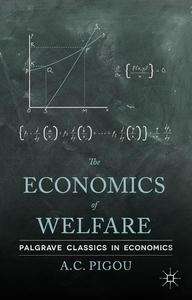The Economics of Welfare

Editorial Palgrave Macmillan
Lugar de edición
Portugal
Fecha de edición noviembre 2013 · Edición nº 1
Idioma inglés
EAN 9780230249318
420 páginas
Libro
encuadernado en tapa blanda
Resumen del libro
In The Economics of Welfare, originally published in 1920, Pigou reconceptualized economics as a science of economic welfare, in the course of which he developed the first systematic theory of market failures. Employing Alfred Marshall's theoretical framework and the utilitarian logic of Henry Sidgwick, he argued that the Smithian 'system of natural liberty' can fail to maximise economic welfare in three crucial spheres. Economic transactions grounded in the free play of self-interest may achieve a suboptimal allocation of resources by producing spillovers; they may maldistribute the national income, damaging much of the population; and they may generate business cycles, causing unemployment as well as income and consumption instabilities. In his analysis of how to repair these failures, Pigou made an elaborate, carefully reasoned case that interventions in otherwise unfettered markets may be in order.
This reissued classic includes a new introduction by Nahid Aslanbeigui and Guy Oakes, who offer fresh ideas on The Economics of Welfare as a treatise that cannot be reduced to a programmatic collection of taxes and subsidies designed to maximise economic welfare. They also spell out the implications of Pigou's thought for contemporary economics.








